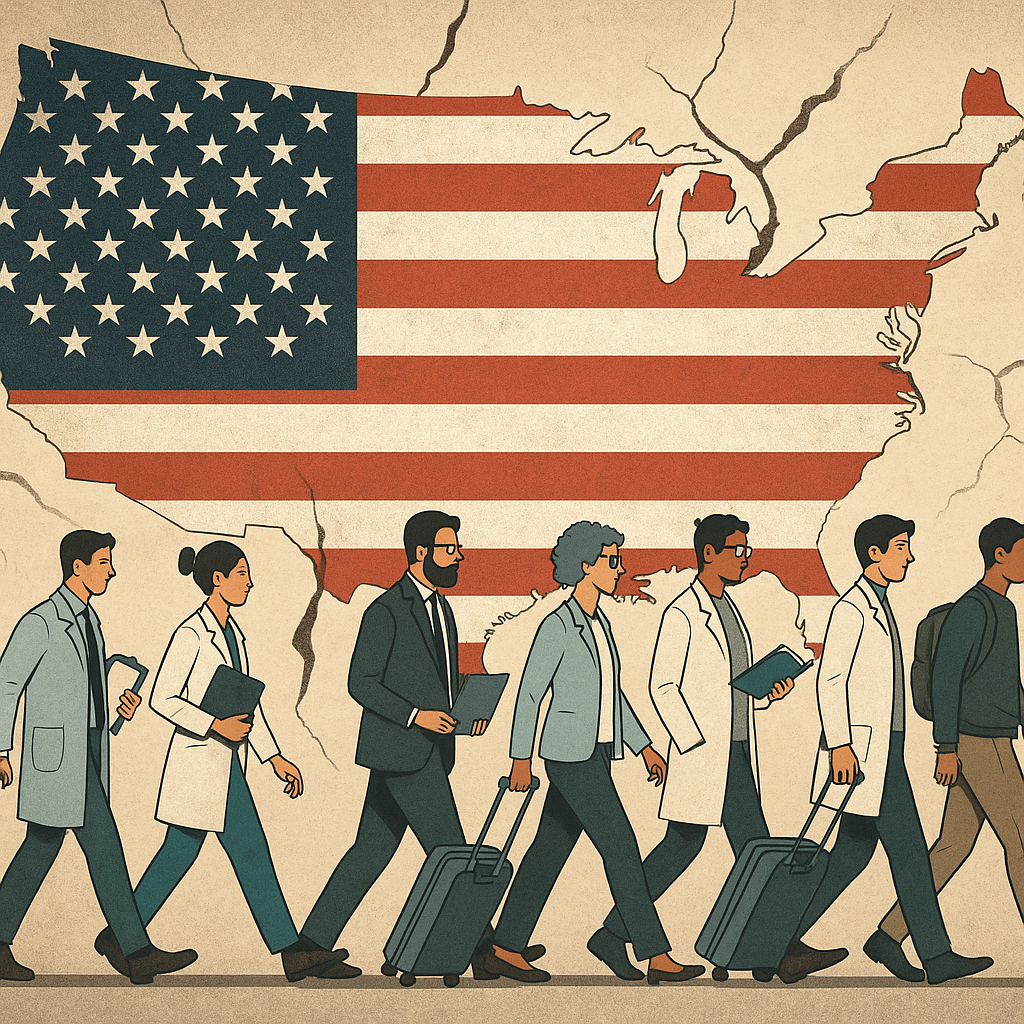Shifting Conference Maps: Why More International Conferences Are Looking Beyond the U.S.
-

 Is traveling to a U.S. conference getting harder?
Is traveling to a U.S. conference getting harder? A computer-science researcher can only manage an embarrassed smile.
A computer-science researcher can only manage an embarrassed smile. An environmental scholar says she hasn’t needed a Stateside trip in ages.
An environmental scholar says she hasn’t needed a Stateside trip in ages.- 🧬 A life science lecturer saw two students receive visas while his own was delayed.
 A graduate student, stuck at the embassy, asked a classmate already in America to present his work.
A graduate student, stuck at the embassy, asked a classmate already in America to present his work.
“I don’t think many students want to come to the U.S. now.”
— Professor at the Global Physics Summit, Los Angeles, March 2025 (15 000 attendees, ~4 000 from abroad)The United States still hosts thousands of top-tier conferences each year, thanks to world-class universities and infrastructure. Yet in 2025 a noticeable shift is under way and some researchers are choosing other venues.
 A more demanding border
A more demanding border- Jan 2025: Donald Trump returns to the White House.
- Broader secondary screening now meets many visitors, regardless of passport.
- 4 Jun: Executive Order 14222 restricts travelers from 12 nations and partially from seven more.
- 14 Jun: A State Department memo hints the list could grow to 36 countries, affecting nearly ¼ of the world’s scholars.

U.S. officials say the policies target security threats, while scientific societies warn of unintended barriers to collaboration.
 Canada takes the first step
Canada takes the first step- Early 2025: Trade tensions and political rhetoric prompt some Canadians to rethink travel south.
- Ipsos poll: 62 % of Canadians plan to skip U.S. visits this year.
- Conferences opting for Canadian venues:
- 🧠 International Conference on Comparative Cognition (CO3) → Montréal
 International Society for Research on Aggression (ISRA) → Canada
International Society for Research on Aggression (ISRA) → Canada Work–Family Researchers Network (WFRN) → Canada
Work–Family Researchers Network (WFRN) → Canada ASCP + CAP joint meeting (despite six-to-one U.S./CA membership) → Montréal 2026
ASCP + CAP joint meeting (despite six-to-one U.S./CA membership) → Montréal 2026
Organizers say the goal is pragmatic: maximize in person attendance while reducing visa uncertainty.
 Visa anxiety goes global
Visa anxiety goes global Adi Shamir (Turing laureate) was denied a visa for RSA, the security event he cofounded.
Adi Shamir (Turing laureate) was denied a visa for RSA, the security event he cofounded. A French astrophysicist was turned back after officers saw slides critiquing U.S. budget cuts.
A French astrophysicist was turned back after officers saw slides critiquing U.S. budget cuts. ️ A Lebanese nephrologist was refused entry over photos seen as “security-sensitive.”
️ A Lebanese nephrologist was refused entry over photos seen as “security-sensitive.” DEI scholars report lengthy questioning at customs.
DEI scholars report lengthy questioning at customs.
Several European governments now issue travel advisories, and some academics limit U.S. trips to essential visits only.
 Meetings on the move
Meetings on the moveIn the four months after inauguration, The Intellectual counted 20 plus high profile events that were delayed, relocated, or cancelled a “conference chill” not seen in years.
 IXAS moved its 2026 meeting from Chicago → Bangkok.
IXAS moved its 2026 meeting from Chicago → Bangkok. CES launched a Netherlands based European edition.
CES launched a Netherlands based European edition.- 🩺 HLTH is planning a Latin America spin off.
 The North American Society for the Sociology of Sport added a parallel Vancouver hub linked to Seattle via livestream.
The North American Society for the Sociology of Sport added a parallel Vancouver hub linked to Seattle via livestream.
Many organizers stress these moves are contingency planning, not a wholesale abandonment of U.S. venues.
 Budgets & policy pressures
Budgets & policy pressuresAlongside visa hurdles, federal belt-tightening and state-level legislation affect meeting plans:
 IACBT cancelled its Tennessee conference amid funding cuts.
IACBT cancelled its Tennessee conference amid funding cuts. ️ The U.S. Air Force postponed its July procurement workshop (previously cancelled only for COVID).
️ The U.S. Air Force postponed its July procurement workshop (previously cancelled only for COVID). ️⚧️ Philadelphia’s long-running Transgender Health Conference ended in-person gatherings amid new regulations.
️⚧️ Philadelphia’s long-running Transgender Health Conference ended in-person gatherings amid new regulations.
 Economic ripples
Economic ripples Venue network Hotel Lobbyists logged 46 cancelled federal events by March, costing ≈ $1.9 million.
Venue network Hotel Lobbyists logged 46 cancelled federal events by March, costing ≈ $1.9 million. The Providence–Warwick tourism bureau lost $4 million after four government meetings were dropped.
The Providence–Warwick tourism bureau lost $4 million after four government meetings were dropped.
“Conferences are a barometer of international engagement,”
— Jessica Reinisch, Birkbeck, University of LondonThe American Physical Society notes it is “working with members to navigate evolving travel rules.”
 ️ Small cracks, long term impact?
️ Small cracks, long term impact?The vast majority of U.S. conferences continue as planned. Yet each visa denial, venue switch, or proxy presentation loosens another brick in the wall of global exchange.
The creaks may be faint, but they remind us that scientific collaboration relies on open doors and those doors now hinge on policy choices felt far beyond any single border.

